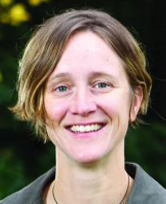Speaker series on fake news and misinformation, co-sponsored by the NULab at Northeastern University.
Recent public attention and debate around “fake news” has highlighted the growing challenge of determining information veracity online. This is a complex and dynamic problem at the intersection of technology, human cognition, and human behavior—i.e. our strategies and heuristics for making sense of information may make us vulnerable, within online spaces, to absorbing and passing along misinformation. Increasingly, it appears that certain actors are intentionally exploiting these vulnerabilities, spreading intentional misinformation—or disinformation—for various purposes, including geopolitical goals. Drawing on research conducted on online rumors in the context of crisis response, this talk explores what alternative narratives (or “conspiracy theories”) of crisis events reveal about “fake news”, political propaganda, and disinformation online.
Kate Starbird is an Assistant Professor in the Department of Human Centered Design & Engineering (HCDE) at the University of Washington, and Director of the Emerging Capacities of Mass Participation (emCOMP) Laboratory. Her research sits at the intersection of computer science and social science and falls within the fields of Human-Computer Interaction (HCI) and Computer-Supported Cooperative Work (CSCW). One major focus of her work examines the use of social media during crisis events, specifically looking at how the converging audience (aka, the “crowd”) can contribute—and is already contributing—to crisis response efforts. Using a combination of empirical methods, including qualitative, computational and network analysis, Starbird examines both small group and large scale interaction online within the context of disasters and other mass disruption events, studying how digital volunteers and other members of the crowd work to filter and shape the information space. The emCOMP Lab examines the dynamics of and applications for massive interaction facilitated by social media and other online platforms. The lab also considers how connected, collective intelligence manifests and can be supported within contexts of emergency and humanitarian response, political disruption, and other events of large-scale interest (e.g. major news, sporting, and entertainment events). Dr. Starbird received her PhD in Technology, Media and Society from the ATLAS Institute at the University of Colorado in 2012, where she examined both large-scale and small group online interaction during crisis events, studying how digital volunteers and other members of the connected crowd work to filter and shape the information space. As part of that research, she co-created and developed the infrastructure to support the “Tweak the Tweet” project, an innovation for using Twitter more effectively as a channel for reporting actionable information during crisis. She was awarded an NSF Graduate Research Fellowship for her PhD studies.


